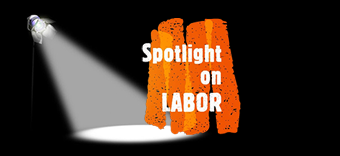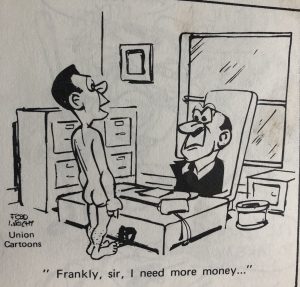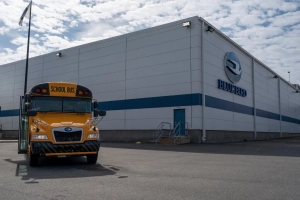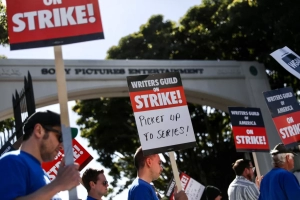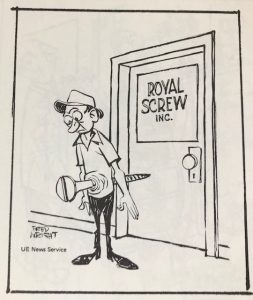
“Fred Wright cartoon courtesy of United Electrical, Radio & Machine Workers of America (UE)”.
“The teamsters will strike any employer, when necessary, no matter the size or the depth of their pockets,” was the defiant response of Teamster Union President Sean O’Brien to the latest Supreme Court decision that sharply impedes the ability of labor to conduct strikes. “The political hacks at the Supreme Court have again voted in favor of corporations over working people,” he declared. “Make no mistake – this ruling has everything to do with giving companies more power to hobble workers if any attempt is made to fight back against a growing system of corruption…. American workers must remember that their right to strike has not been taken away. All workers, union and nonunion alike, will forever have the right to withhold their labor.”
O’Brien’s sharp comments were the Teamsters’ reaction to the Court’s ruling June 1 saying that employers could sue unions in state courts for damages to their goods during a strike, overturning years of legal precedent that the National Labor Relations Board had the initial jurisdiction in the case.
The case, Glacier Northwest v. International Brotherhood of Teamsters, involved unionized members of a concrete mixing and pouring company. The company and the union were in negotiations for a contract when negotiations broke down and the union called a strike. The workers, who had reported to work that day, had already poured wet concrete in their trucks. The workers took precautions to keep the trucks running to prevent the hardened cement from damaging the trucks, meeting legal standards for taking responsible steps to avoid harming the employer’s property. The lost concrete on the trucks simply amounted to lost spoilage of a product for which unions have not been held legally responsible.
Nevertheless, Glacier Northwest sued the union for damage to the cement. In cases like this, the National Labor Relations Board is the adjudicator in the dispute. And in fact, the NLRB general counsel had already found that by preventing damage to the trucks, the workers had taken the necessary steps to prevent harm to the employer’s property and that the union was, in legalese, “arguably protected” from spoilage to the product that normally often occurs during a strike. After all, the whole purpose of a strike is to cause the employer economic harm and pressure him to negotiate a satisfactory contract, providing there is not malicious vandalism to his property.
Ignoring precedent and facts in the case, Justice Amy Coney Barrett, writing for the eight justice majority, said that the union workers were responsible for the damage to the cement and that the state court in Washington should hear the company’s lawsuit. Justice Ketanji Brown Jackson was the lone dissenter. The other two liberal justices joined in the majority opinion and there is speculation that they did so to obtain a bargained compromise to avoid a much harsher judgment against unions.
Justice Clarence Thomas, for example, writing for himself and Justice Gorsuch, said that the court should reconsider whether the NLRB should even have initial jurisdiction in such cases. Justice Alito went even further, questioning the NLRB’s legal right to decide labor cases.
The ruling is only the latest in a string of decisions in favor of corporations against unions issued by this court in the past several years. A decision in 2018, contrary to the National Labor Relations Act, said that companies could prohibit workers from collectively bringing legal actions against employers. Also in 2018, the court ruled that public sector unions could not require nonmembers to pay fees for the benefits that the union’s bargaining had gained for them. Three years later, the court did it again, deciding that a California law that allowed organizers for the Farm Workers union access to the employer’s property to speak to workers during their lunch time and breaks, was unconstitutional.
The latest ruling, while not prohibiting strikes, makes it more difficult for unions, since they will have to consider the economic effects of company lawsuits and the resulting uncertainty of court decisions, particularly with a Supreme Court biased in favor of employers. Often, it is just the threat of a strike that helps unions win concessions. Since unions would now hesitate to use the strike weapon, “without the threat of a strike, you have little leverage in negotiations,” commented Stuart Appelbaum, president of the Retail, Wholesale and Department Store Union.
NY Times, 6/1, also see Elie Mystal’s This is not the End of the Supreme Court’s War on Labor in The Nation, 6/2
